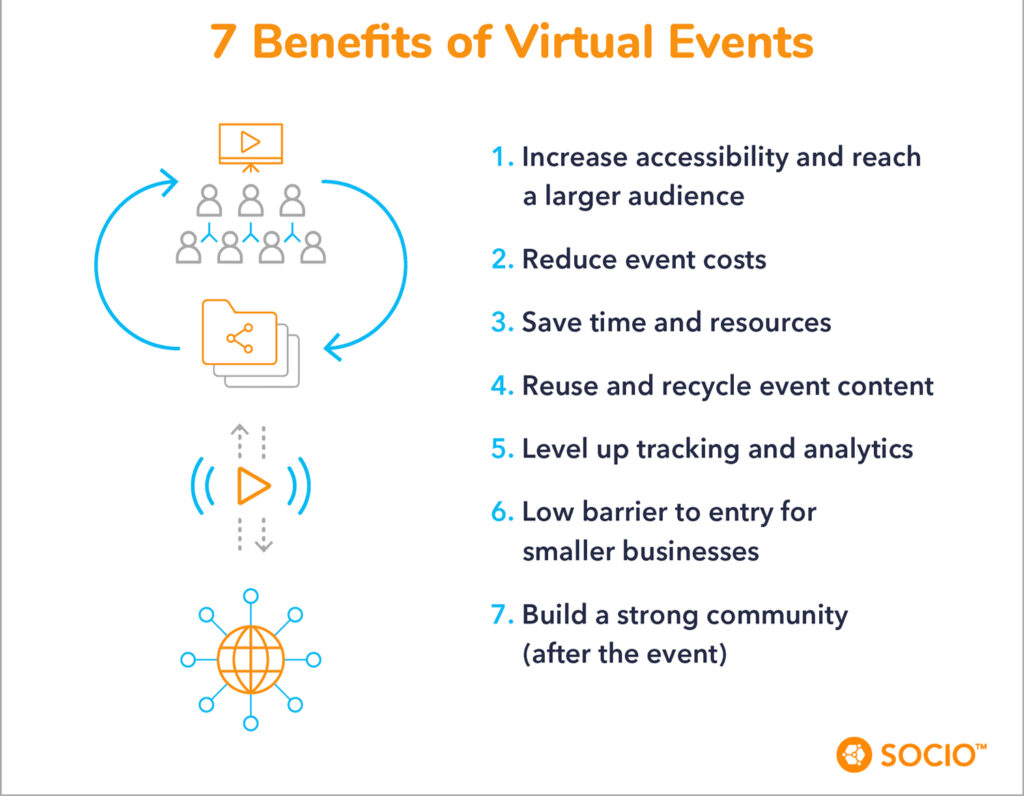When COVID-19 kept people from traveling or gathering in person, businesspeople suddenly had to rethink networking opportunities. As a result, trade show alternatives in a post-pandemic world have become a growing trend for organizations.
The global pandemic impacted no industry more than live events. Trade shows lost $330 billion. More than lost sales, business people also missed out on connecting with peers and learning from educational opportunities. Even after the pandemic, some were (and still are) leery about traveling or gathering in large groups. Through innovation and creative solutions, trade show alternatives in a post-pandemic world have become a successful and beneficial approach to networking.
Keep reading to learn ways to connect with industry leaders, peers, and customers in a post-pandemic world.
Key Takeaways
- Trade shows offer impactful value like brand awareness, resources, and marketing opportunities.
- COVID forced event planners to reimagine trade shows and taught us that, through creative problem-solving, professionals could find value in virtual gatherings.
- Trade show alternatives include virtual booths, online events, and virtual one-on-one meetings.
What COVID Taught Us About Trade Shows
When sheltering in place was seemingly the most effective way to keep communities safe and healthy, live trade shows halted. Even if people were comfortable commuting, most people weren’t sharing small spaces with others, so flights and mass transit weren’t viable options for travel. All of this meant that live events couldn’t take place. But trade shows are essential events that offer value, like:
- Brand awareness
- Brand marketing for manufacturing companies
- Educational opportunities
- Professional resources
- Expert panels to answer industry questions
- Connecting with customers and peers
- Product demonstrations
Realizing business people still needed a way to connect and engage on a professional level, event planners began to reimagine the live trade show. Through innovation, brainstorming, and creative problem-solving, these individuals started to reconfigure the trade show as we know it. They adapted it to the current circumstances of the world at the time.
As a result, we learned that trade shows could take place virtually. Live online events could host hundreds of people in real time. This allowed them to attend educational workshops and engage in forums and chat threads to maintain a level of networking and connectivity that people enjoy at trade shows.
Digital meetings and discussions enabled people to demonstrate their products as they would at a trade show booth. Discussion panels allowed people to learn from industry experts. And the two best parts were:
- No geographical limitations: Because traveling is unnecessary, anyone can attend these virtual events. There were no airfare or hotel fees to consider, so it was suddenly economically feasible to bring people together worldwide.
- More cost-efficient: While there were sometimes fees associated with hosting large events online, groups we didn’t have to rent out large venues or facilities, pay for extra equipment like stage lighting or sound systems, hire additional staff to maintain and coordinate the event, or pay room set-up and cleaning fees.
The pandemic taught us that manufacturers could still enjoy the value of a trade show without risking health and safety.

Top 3 Trade Show Alternatives
Here are some trade show alternatives that can help businesses effectively connect with industry leaders, peers, and current and prospective customers.
1. Virtual Booth
Businesses set up a booth at a traditional trade show to display their products, demonstrate their goods, and build their company image. Just because you’re not meeting in person doesn’t mean people shouldn’t still have that same booth experience.
Set up your booth as you would at a show and offer a virtual tour. Whether you live stream the experience or record it and post it later to your website and social media pages, your virtual booth can still walk people through your offerings, provide demonstrations, and give you a chance to tell your company’s story.
A virtual booth is more than an opportunity to showcase your brand and products. It’s a way to boost marketing for manufacturers. After all, when publishing your video, you can include wording that aligns with audience keyword searches. These SEO basics for manufacturing and industrial companies can help you rank high on SERPs and gain more visibility for increased conversions. Virtual booth tours can also help manufacturing companies drive website traffic. Your audience wants to see what you’re doing and learn from the information you provide.
Include a tab on your website’s home page where visitors can click to see all your videos. Organized content helps people quickly find what they’re looking for and is among website must-haves for manufacturing companies.
2. Online Event
Create an online event where you can host multiple virtual guests, share product information and demonstrations, and answer questions.
Feature products and services you would have highlighted at a trade show. Display them in a digital gallery or online post where attendees can inspect them virtually and learn more about their features and functions, just as they would at an in-person trade show.
Consider hosting a series of these events that feature a specific product line and some educational content that pertains to current industry trends. Use audience research to identify what kind of information people want to consume. This can help you create effective content marketing for manufacturing companies. As a result, you’ll be able to build a loyal following since people will see you as a trusted resource of information and will continue to return for more value.
The following video provides helpful tips and strategies for hosting a successful online event:
Source: Eventbrite on YouTube
3. One-on-One Virtual Meeting
Trade shows allow individuals to schedule one-on-meetings with a company representative to ask questions about their unique needs. You can create this same environment by hosting one-on-one virtual meetings and giving clients a personalized tour of your products. It also helps you build a deeper connection with potential customers and lasting relationships. This is important because 65% of sales come from existing customers.
These private virtual meetings help people better understand your company, learn who you are as a representative, and can ultimately influence their purchase decision.
Succeed with Trade Show Alternatives
Shanahan Strategy closely monitors trends in marketing for manufacturing companies. Our industry experts help industrial companies develop effective digital marketing strategies to connect with their audience and increase conversions.
Contact Shanahan Strategy today to learn how we can help your business develop trade show alternatives and trade show marketing that deliver results.


